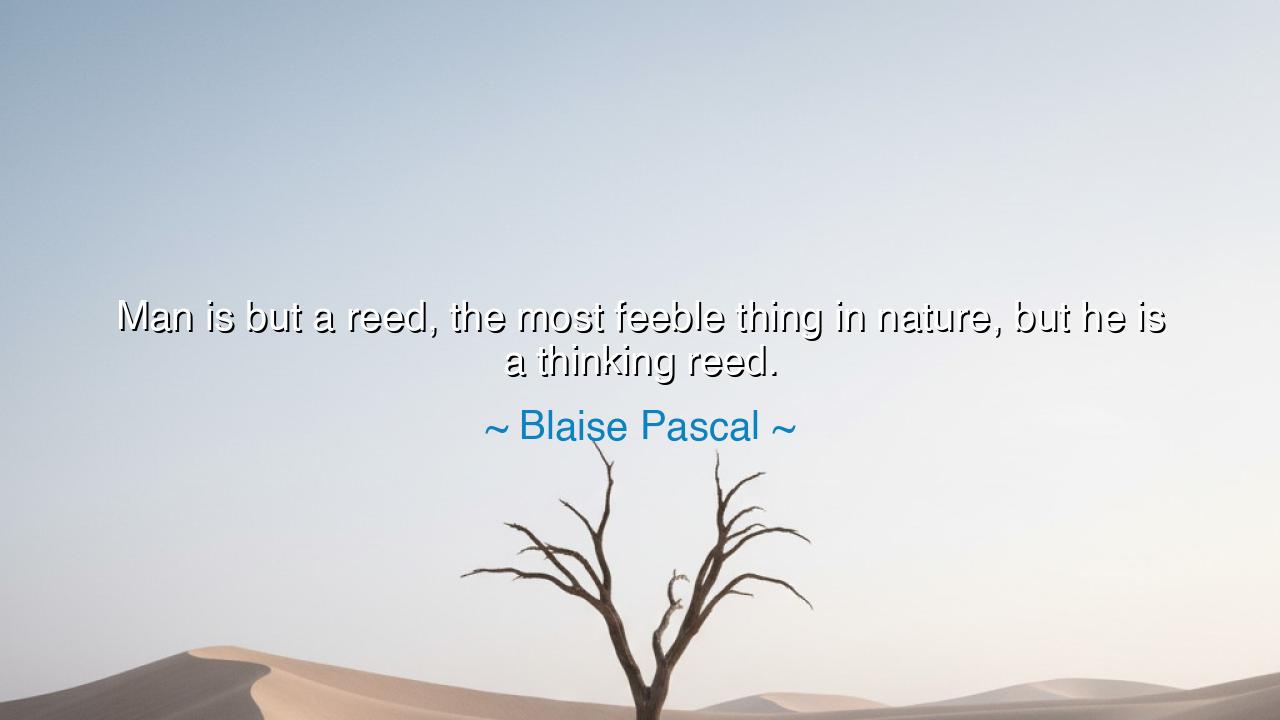
Man is but a reed, the most feeble thing in nature, but he is a






Hear, O children of eternity, the solemn and stirring words of Blaise Pascal: “Man is but a reed, the most feeble thing in nature, but he is a thinking reed.” In this paradox lies the full mystery of the human condition—frailty and majesty bound together in one fragile vessel. For man is weak before the storm, easily crushed by the weight of nature, more delicate than the beasts and the elements. And yet, he is exalted, for unlike the reed that bends by the river, he possesses the gift of thought, and in that thought dwells his greatness.
Pascal spoke these words in his Pensées, in a time of great inquiry and conflict, when faith and reason contended for supremacy. He had looked into the heavens and seen the vastness of the stars, compared the measure of man to the infinity of creation, and judged that man is small—smaller than the grass that perishes, smaller than the dust that blows across the fields. But then he beheld another truth: though man is physically feeble, though the universe could destroy him with a breath, yet man knows it. He contemplates the cosmos, and in his contemplation he transcends it.
This is the meaning of the thinking reed. The reed is frail, but unaware of its frailty. Man is frail, but aware of both his weakness and his dignity. The storm may crush him, but even in dying, he knows more than the storm that kills him. In this lies a nobility that no force of nature can take away: man’s greatness is not in strength of body, but in strength of awareness.
History gives us examples of this paradox. Consider Socrates, condemned to death by the city of Athens. His body was powerless before the law of the state, and he drank the hemlock with no resistance. Yet in his last moments, he spoke of the immortality of the soul, of truth, of virtue. His flesh was frail, like a reed, but his thought elevated him beyond fear and beyond time. To this day, his life teaches us that the weakness of the body cannot enslave the freedom of the mind.
Or consider Anne Frank, a child hiding in the shadows of tyranny. Her body was frail, her situation hopeless before the crushing power of war. Yet she wrote with clarity, with vision, with hope that reached beyond her imprisonment. Her words survived where her body did not, because her thinking outlived her frailty. She, too, was a reed—but a reed whose thoughts shook the conscience of the world.
The lesson, then, is this: do not place your pride in strength, wealth, or power, for these are fragile and fleeting. Rather, take courage in your ability to think, to reflect, to know right from wrong, to rise above mere instinct. Your dignity lies not in what you can conquer, but in what you can contemplate. Even when powerless, you may yet understand truth, and that understanding makes you greater than all that can destroy you.
Practical wisdom follows: cultivate your mind, nurture your awareness, deepen your reflection. When you face hardship, remember that though you are frail, your thoughts may still rise above circumstance. When you behold the beauty of the world, let it fill you with wonder, for in your ability to marvel lies your true power. When you encounter injustice, speak and think against it, for your voice, though weak, is lifted by the eternal dignity of thought.
Thus, O children of tomorrow, remember Pascal’s words: you are reeds, fragile in body, yet exalted in mind. The winds of fate may bend you, the storms of life may strike you down, but your awareness of truth, of beauty, of eternity makes you greater than the storms. Live not as beasts of instinct, but as thinking beings, and your frailty shall become your glory.






AAdministratorAdministrator
Welcome, honored guests. Please leave a comment, we will respond soon